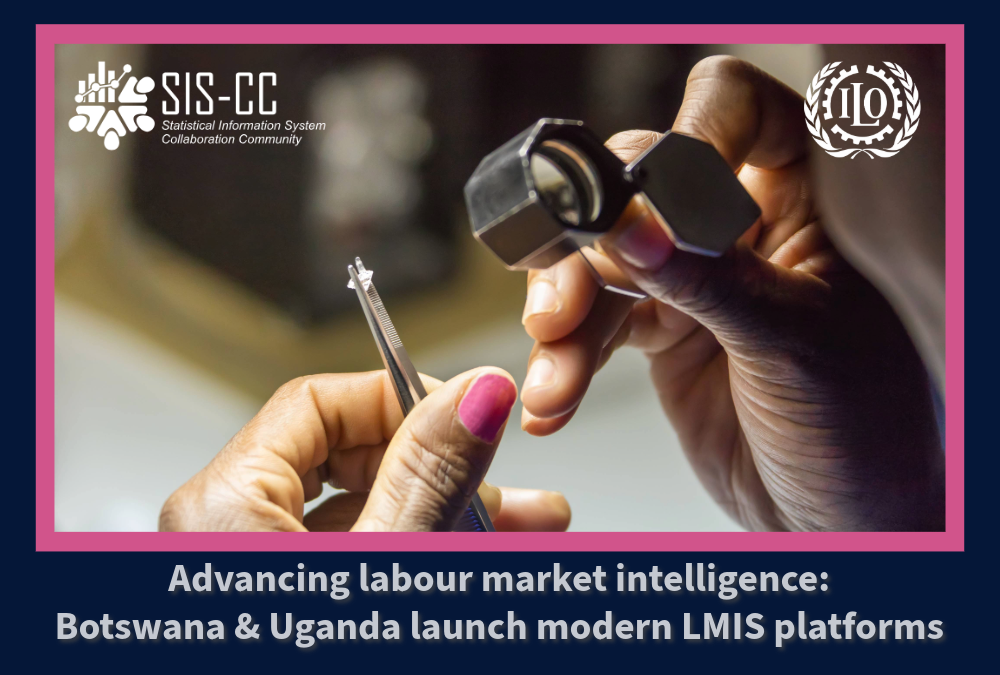
Amid a shifting global employment landscape, timely and reliable labour market data is more essential than ever. Governments worldwide are recognising the value of comprehensive in designing informed employment policies, improving workforce planning, and enhancing economic resilience. Two recent milestones from Botswana and Uganda underscore the momentum building in Africa, supported by the International Labour Organization (ILO) and underpinned by the .Stat Suite through ILO’s SIS-CC membership.
Botswana’s LMIS.STAT sets a new regional benchmark
In August 2024, Botswana officially launched its new Labour Market Information System – developed in close collaboration with the Human Resource Development Council (HRDC) of Botswana – marking a significant milestone in the country’s journey toward evidence-based employment policy and improved data-driven governance.
LMIS.STAT is now an active labour market policy tool, gathering, analysing, and disseminating a broad spectrum of indicators. It enables users to access data on employment conditions, industry trends, occupational statistics, projections of job openings, current vacancies, and the landscape of education and training opportunities. By providing this level of access and granularity, the system empowers policymakers, employers, job seekers, and students alike to make more informed decisions.
Crucially, the system draws on .Stat Suite, which provides the technical backbone for the organisation, analysis, and dissemination of statistical information. The open-source platform enables seamless data handling, backed by international standards such as SDMX.
The system also supports the broader work of Botswana’s Labour Market Observatory (LMO), including detailed analysis on structural inefficiencies in the labour market, such as underutilisation of the workforce and gender disparities in employment, translating into concrete policy recommendations.
“The launch of LMIS.STAT is a commendable achievement that will significantly enhance labour market transparency and efficiency. This system will not only benefit Botswana but also serve as an exemplary model for other countries.”
Alexio Musindo (ILO Country Office Director)
Uganda’s LMIS launches with strong institutional commitment
More recently, on May 1st 2025, Uganda officially launched its Labour Market Information System, marking a major step forward in modernising its labour data infrastructure. The launch formed part of Uganda’s wider commitment under the Decent Work Country Programme III (DWCP III), a national initiative aimed at promoting social justice, employment equity, and inclusive economic growth.
The LMIS was developed through a strong partnership between the Ugandan Ministry of Gender, Labour and Social Development, the Uganda Bureau of Statistics (UBOS), and the ILO, with technical and financial support provided under the Better Regional Migration Management Programme (BRMM), funded by the UK’s Foreign, Commonwealth and Development Office (FCDO).
Using the .Stat Suite as its technological backbone, the LMIS provides a user-friendly and scalable platform for collecting, analysing, and disseminating labour market data—including statistics related to labour migration and employment trends. It also integrates SDMX standards to ensure harmonisation with international data systems.
The ILO provided installation and training for the .Stat Suite, ensuring Uganda’s LMIS is built on a scalable, standards-based infrastructure. Technical knowledge transfer was conducted for IT staff to support long-term sustainability and platform maintenance.
“Uganda, we are honoured to walk this journey with you. The ILO stands ready to support implementation through technical cooperation, innovation, and capacity-building.”
Caroline Khamati Mugalla (ILO Country Office Director)
This work is already yielding dividends: for instance, a pilot initiative in the Greater Kampala Metropolitan Area helped hundreds of returned migrants to establish small businesses with targeted training and financial support.
A regional shift towards data-driven employment policy
Through the SIS-CC, the ILO provides not only access to the .Stat Suite but also technical assistance to support the deployment and long-term success of these platforms.
“As proud members of the SIS-CC community, our active engagement and participation within the community is essential to our strategy, empowering us to provide robust support to our constituents. This enables them to fully leverage .Stat Suite’s technical evolution and adopt key international standards like SDMX. This fruitful journey continues to gain momentum, with over 30 LMIS projects now expanding worldwide and many more production launches on the horizon.”
Weichen Lei (ILO Statistical Knowledge Management Officer)
By investing in integrated, modern information systems, Botswana and Uganda are demonstrating how technology and international cooperation can unlock powerful insights into labour dynamics. Their work paves the way for other countries seeking to align employment strategies with real-time data, and ultimately, to foster inclusive and sustainable economic growth.


